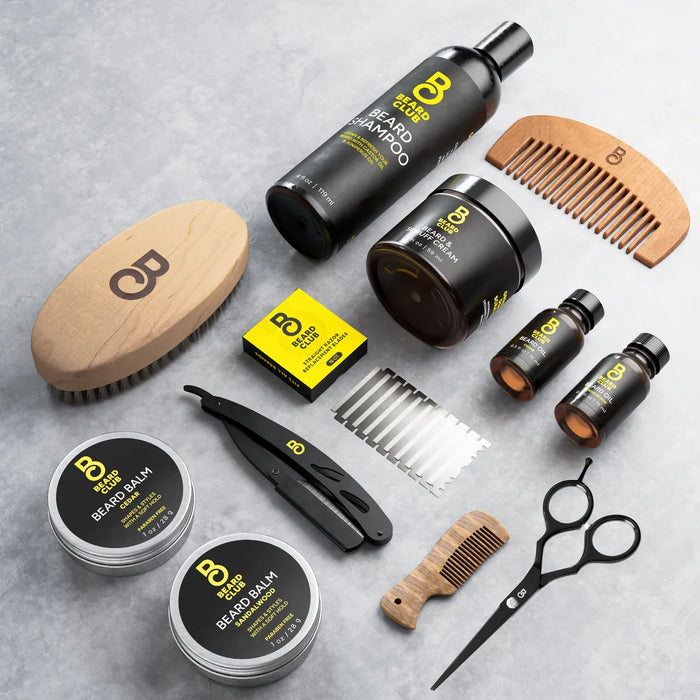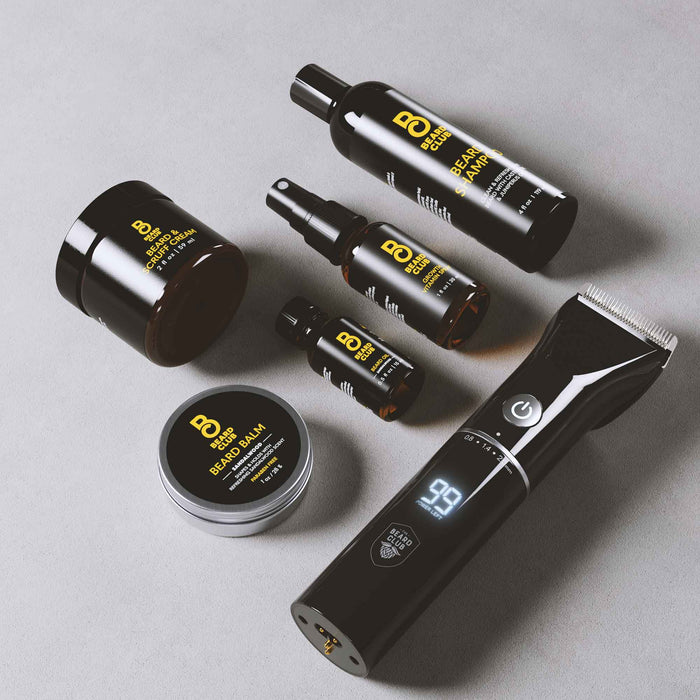Tapered Beards: How To Grow and Maintain a Gradient Beard
One of the best parts about getting a good haircut is seeing the stylist fade your hair. The tapered look is one of the manliest looks a guy can go for, especially when the gradient transitions your hair into your beard.
Any barber worth their salt knows how to fade better than they know their name. However, most men never think twice about how hard it is to get that perfectly trimmed fade, especially with a gradient beard. Not many men understand the precision needed until they decide to start grooming their hair.
Self-grooming is a worthy endeavor, but don’t think for a moment that it will be an easy road. To get that professional look, you need patience, a steady hand, and a keen eye. One bad move and you might just have to shave things down to something simpler. No one wants that.
A tapered beard, also known as a gradient beard, blends the lengths of your hair from as long as you want to stubble or bare skin. There are a thousand possibilities that fall within this category, but we’re going to stick with the basic styles in this article. Getting your hair to appear gradually longer can be a tough feat, but it is doable.
Some men enjoy crisp line-ups, but more and more men are going the tapered route. Romantic partners love it, and it gives off a professional look that screams, “I have the money to hit the barber shop weekly.”
What they’ll never know, though, is that your secret is not going to the barber shop but doing everything within the comfort of your own home.
Let’s Begin: How To Grow and Maintain a Gradient Beard
As we mentioned previously, this is not a simple how-to guide that will immediately grant you the necessary skills. Getting it right will take time, so practice some patience and leave yourself plenty of room for failure. Eventually, practice will make perfect, and your neighbors will be begging you to cut their hair too.
#1: Preparation Stage
First things first, let’s make sure you have everything you need.
There’s nothing worse than starting a project and realizing you’re short a tool or two. This is as true for grooming as it is for construction projects at home. There are various tools needed to get this right. Luckily for you, we have everything you need.
The most essential element is, well, a beard. You can’t taper a beard if there’s nothing to taper. If you recently shaved and need some assistance in that area, then pause for a few weeks and grow out your beard.
Once you obtain a beard (anywhere from short to long is fine), you will need to invest in some gear if you haven’t already. A precision trimmer is your new best friend. Forget that lifelong buddy that you’ve known since grade school who was the best man in your wedding. The PT45 Beard and Hair Trimmer is the greatest companion a man can ask for.
Our trimmer comes with an excellent range of 45 trim settings, including eight separate guards, for all your trimming needs. They are even color-coded for your convenience. Don’t settle for less: Your beard deserves the best.
In addition to the trimmer and guards, a beard comb is a smart investment. This is especially true if you are working with a lengthier beard.
#2: Start Things As Normal
If you have a typical way of cleaning, shaping, and moisturizing your beard, begin there. Beard care is essential for healthy facial hair and a happy beard. You’ll want to create a daily beard grooming checklist if you don’t have a regular routine already.
We suggest this for several reasons. First of all, there is already a steep learning curve with gradient beards, so we don’t want to change too much for you. Secondly, tapering makes any beard style better, so starting with a style you’re comfortable with is a fantastic entry point into the world of beard fades. Thirdly, once again, beard care is essential!
The fourth and final reason is that you need a starting point to reference as you create your gradient. If you go for it with no plan, the result will most likely disappoint you. Patience and planning are key elements here.
#3: Crispen Up and Mentally Prep
Now that your point of reference is set, get your cheek and neck lines crisp, then grab the guard you normally use to get the beard length you want. Start with the beard guard you probably just used to clean up your beard: You want to go back over what will be the longest part of your beard.
#4: Goodbye Neck Beard
Go ahead and grab the next number under what you just used. The smaller the number of your guards, the shorter they will cut your hair. You can also adjust via half numbers if your trimmer allows those more minute adjustments. We are going to deal in half inches as we fade away. It’s important to go against the grain when trimming for specific lengths.
Raise your chin and line the trimmer up with your neckline so that it will travel left to right and take away an entire inch strip of hair. Then go down another guard number (or half number) and go back over the bottom half of the strip you just made. At this point, the neck is finished.
#5: Sides and Sideburns
We are approaching this section of your face with a similar plan of action, but now we are in “everyone will notice” territory, so be extra careful. Again, patience is a virtue.
Start at a sideburn’s midpoint with a number down from your beard length. Go upwards to about the top of the sideburn (just below the top of the ear).
Now that the top length of the sideburn is set, switch to the next lower guard and go a little bit above where you initially trimmed. This should be about three-quarters of the way up your ear. We are fading toward your hair right now. Trim that top quarter even shorter.
This is an excellent starting palace and can honestly be left as is. If you want the fade to go longer (basically lower into your beard), then use the same idea and start at a lower point. Instead of halfway up your sideburn, maybe start at the bottom of your ear.
#6: Perfect the Cheeks
This section is probably just as important as the sideburn step because it will be the first thing people notice when they look at your beard. The same principles used in the above steps will once again serve us well. Tapering your cheeks is especially similar to how we made that gradient on your neck.
Grab the guard that is just below your normal beard length and create an inch-long strip along your cheek lines. Be careful not to trim off your mustache connectors. Then use one guard lower to go back over half the width of the strip. For example: If your beard is normally a 4 in length, then a 3 will be used for the initial strip. A 2 will be used for the half-strip.
It should also be noted that, in this case, cutting with the grain is better so that the gradient is more subtle.
#7: Keep Up With Upkeep
While a fade is an amazing look, one of the downsides includes the fact that it is time-consuming to upkeep. If you don’t keep up with the growth, then it will start to look unprofessional.
A weekly tapering is a good system to go for, though special occasions may call for frequent trimmings. Some people with prolific facial hair growth might need to do it two to three times a week.
Summary
Tapering your beard into a gradient may take a lot of work and maintenance, but at the end of the day, it is worth it. The look is universal and attractive to women all around the world. Learning to do it yourself saves you money and time.
Many styles fall within the general group of gradient beards, so those are worth looking into. The awesome thing about tapered bears is their perfect fit with baldness. While baldness is historically a sore spot, times are changing — bald heads are hotter than ever. So, for men with a full head of hair or who rock the bald, consider the tapered beard — it’s a great style for both.
Some styles that you can look into include the long faded beard, short faded beard, cropped cut, skin fade, and thick cropped cut. There are plenty more, and one of them is bound to be the exact style you’ve been looking for.
We want to remind you that, just like most things in life, practice makes perfect. Show some patience and keep at it because we think that you will love having a tapered beard in your arsenal.
Sources:
5 Popular Beard Styles: How Barbers Grow and Maintain Them | IMBC College
Essential Beard Care for Movember and Decembeard | Evergreen Beauty College
Bald men are more confident and attractive, study finds | The Independent













